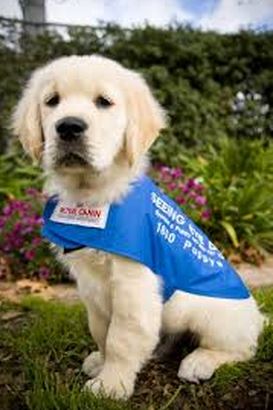One trick up the nonprofit marketer’s sleeve is the celebrity ambassador. Wrangle the right celeb and opportunities will open. That said, celebrity ambassadors or spokespeople are a mixed blessing and not to be engaged without serious consideration.
We’ve worked with a collection of celebrity ambassadors over the years and there’s no doubt it can make things happen and happen faster. When AFL star Joel Selwood agrees to hold a Seeing Eye Dog Australia puppy, the media (hard-bitten, cynical, news-hounds that they are) come running.
Probable positives of a celebrity ambassador:
- increased media interest;
- broader media interest (suddenly FM breakfast radio or the sports section or Radio National breakfast becomes a possibility)
- celebrity has networks in media and business to be leveraged;
- celebrity may be a polished media performer.
Possible Negatives:
- commitment is short-term;
- celebrity supports other causes; is a gun for hire;
- celebrity only supports your cause in lukewarm fashion;
- celebrity supports incompatible commercial interests;
- celebrity is not fully aware of the relevant issues;
- celebrity comes to personifies issue, leaving you beholdent to them;
- celebrity hasn’t got the IQ to get to grips with your issue;
- supporting celebrity takes large amount of effort;
- celebrity gets hypothetically caught in racecourse toilet with cocaine and wife;
- celebrity cannot work within your structure / philosophy.
Shortlisting
Some questions to ask before engaging anyone.
- Is she a right fit with your cause?
- What is she willing to do?
- What is her motivation?
- What does she require financially and logistically?
- Are there skeletons in the closet? Is she long-term?
- Is he dumb?
- What will he achieve what you can’t?
- Will she limit you in some ways? Does she not talk to certain media targets?
- Will he polarise opinion?
- Will he be able to recruit other celebrities?
- Is she a “usual suspect” or “celeb for hire”?
The approach
Unless you have a genuine personal connection to the prospective ambassador you’re going to be in trouble. These people are in demand from neighbours, spouses, old school pals and local shopkeepers. Most celebs have minders in the form of PR flacks and managers. PR flacks care only about PR, managers only about their commission – and you ain’t representing any. So at least the publicist has something to gain.
As a Seven Network publicist Brett handled sports commentating one-name-brand Bruce McAvaney. “We’d sit across the desk and go through the mail – invitations, offers and requests. Dozens of them, weekly. Many of them offered financial opportunities – blue-chip corporates offering payment just for Bruce to attend a lunch and speak his mind on that week’s footy. Thousands. For lunch. Bruce being Bruce would usually pass as he needed to do his famous preparation. He was just too busy. And that’s for the easy, paying gigs. NFPs didn’t really stand a chance with any of the people we looked after.”
Approach the celebrity like you would a journalist when pitching a story – a quick call with written material at the ready. Stay positive, expect a wary, incurious response. Be ready to negotiate. Don’t be offended by over-protective advisors.
This may be one time to take no for an answer – if the celebrity isn’t interested it is unlikely that she will be effective for you.
Try and strike a balance between explaining what you see the the role entailing without being too specific. Can you ask for something low-intensity such as a voice over? This worked a treat when Eric Bana voiced a CSA for our client Mental Illness Fellowship Victoria.
Working on a project for the Telstra Dolphins in the lead up to the Sydney 2000 Olympics we had a media meltdown when the team’s stars – Thorpe, Riley, Kowalski, Huegill and co – toured the country holding swim clinics. Getting the ambassadors to do something they usually do is a good starting point. It certainly eases an agent’s mind. Money also has this affect.
If you do engage a celebrity:
Don’t make your celebrity carry the burden of spreading your message. Use them as a special weapon.
Have them act as MC or entertainment. Shaun Micallef did a great job emceeing a Cerebral Palsy Support Network fund raiser we were part of but was unavailable for media beforehand. Opportunity lost.
Have them make a quick speech or to present a prize. Use their image, quote or signature. Have celebrities host tables at your next function. This may be a more natural role for the celebrity.
Consider paying them something even if it’s a lot to you and little to them. This investment changes the power dynamics and expectations.
Always put down what you expect from each other on paper. It’s professional and avoids unhappiness later on.
Always support the celebrity with information, your bodily presence at any occasion and acknowledgement after the event. No matter what they say, they are used to a certain degree of pampering, flattering and chauffering. Many NFPs aren’t quite up to the challenge. Welcome to showbiz baby.
Found this helpful? Help someone else by sharing it.



